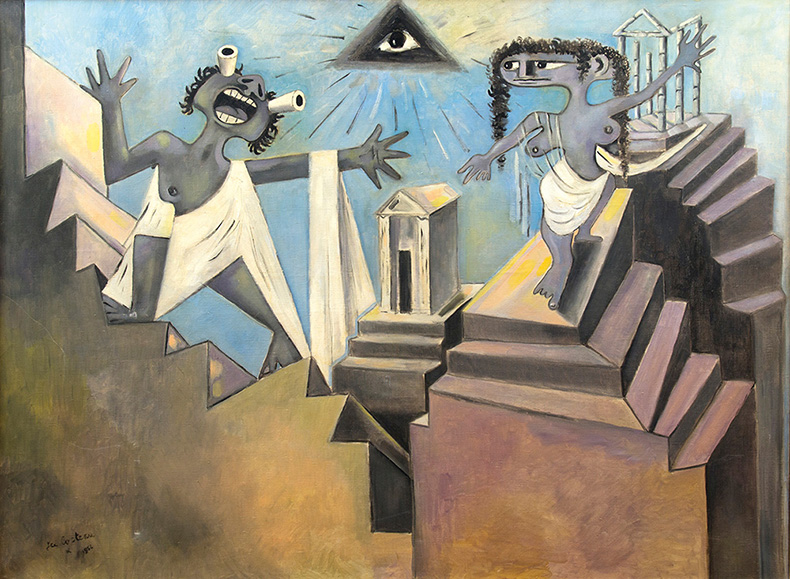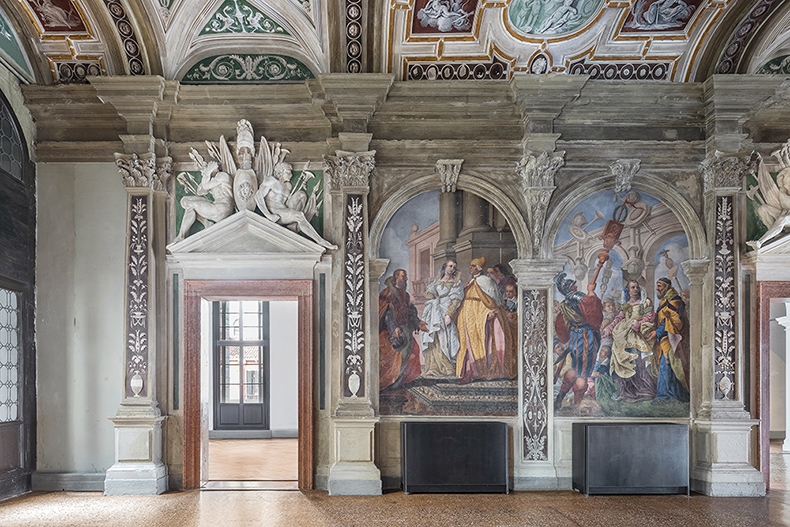From the April 2024 issue of Apollo. Preview and subscribe here.
The Biennale is dominating Venice this month, but the rest of the city still has plenty to offer, from a deep dive into the travels of Marco Polo to a celebration of Jean Cocteau’s genius.
Oedipus, or, the Crossing of Three Roads (Œdipe ou le carrefour des trois routes) (1951), Jean Cocteau. © Jean Clement Eugene Mar Cocteau, SIAE 2024

Jean Cocteau: The Juggler’s Revenge
Peggy Guggenheim Collection
13 April–16 September
The Peggy Guggenheim Collection, housed in the striking 18th-century palace that was the collector’s home for three decades, boasts an impressively varied array of 20th-century art. As an exhibition on Marcel Duchamp ends, the gallery is now playing host to the work of his compatriot and contemporary Jean Cocteau. The exhibition poster shows Cocteau in a trick pose: he has six arms and is using five of them to clutch a book, pen, paintbrush and scissors, and hold a cigarette to his lips. It’s a characteristically playful image but also one that gestures to the Frenchman’s astonishing variety. Everything from drawings to jewellery and photographs to films are on display in the first major Cocteau restrospective to take place in Italy – an exhibition that maps the development of Cocteau’s artistic visions and explores his contributions to Dada, Surrealism and 20th-century culture as a whole.
Guanyin, Bodhisattva of Compassion (13th century), China. Photo: Claudia Obrocki; courtesy Ethnologisches Museum, Staatliche Museen zu Berlin

The Worlds of Marco Polo: The Journey of a 13th-century Venetian Merchant
Palazzo Ducale
6 April–29 September
Marco Polo’s account of his travels in Asia informed Western views of the continent for centuries after its publication in around 1300. To mark the 700th anniversary of his death, the Doge’s Palace is shedding light on the historical, commercial and scientific context of the Venetian’s adventures through a wide-ranging exhibition of maps, ceramics, coins, manuscripts and other parephernalia from the period, as well as a contemporary art installation.
The Fondazione Prada in Venice. Photo: Marco Cappelletti/DSL Studio; courtesy Fondazione Prada

Christoph Büchel: Monte di Pietà
Fondazione Prada
20 April–24 November
One of the major talking points of the 2019 Biennale was the Swiss artist Christoph Büchel, whose work Barca Nostra – made from a rusting fishing boat that sank in 2015 and killed more than 1,000 Libyan migrants – provoked outrage in some quarters. Büchel is back in Venice with this installation that combines old and new works as well as his ongoing piece, The Diamond Maker, a suitcase of lab-grown diamonds made from carbon extracted from his own unsold artworks.
La grâce de l’aurore (2001), Chu Teh-Chun. © ADAGP 2023/Fondation Chu Teh-Chun

Chu Teh-Chun: In Nebula
Fondazione Giorgio Cini
20 April–30 June
Chu Teh-Chun (1920–2014) was born in China and lived there until the age of 35, before moving to Paris, where he would stay for the rest of his life, becoming a member of the Académie des Beaux-Arts in 1997. Over the course of his life he developed an inimitable style that drew on Chinese painting techniques as well as Western abstract aesthetics. His most recent canvases begin this retrospective, which then traces his career all the way back to the year he settled in France.
Pirate (Untitled II) (1981), Willem de Kooning. © 2024 The Willem de Kooning Foundation, SIAE

Willem de Kooning and Italy
Gallerie dell’Accademia
17 April–15 September
The American painter Willem de Kooning visited Rome in 1959 and then again a decade later. These two trips led him to overhaul his artistic vision: seduced by the slipperiness and plasticity of clay, he began to produce sculptures, while incorporating sculptural influences into the Abstract Expressionist canvases that were his staple. This exhibition displays works from the 1950s to the ’80s and asks why Italy made such a lasting impression on the artist.
From the April 2024 issue of Apollo. Preview and subscribe here.


